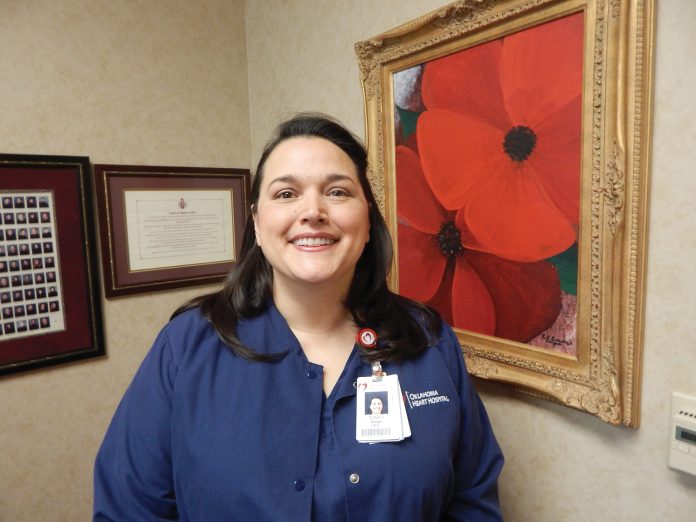
by James Coburn
Staff Writer
Ginny Mennis, RN, sees a variety of patients as the Progressive Coronary Care Unit manager at the Oklahoma Heart Hospital in northwest Oklahoma City. Mennis has acted in this new role since July.
“We get patients from the ER or we get people admitted who maybe need a pacemaker and then we send them off for placement and they come back to us as well,”
Patients are prepared in the PCCI at OHH for open heart surgery. They will go for surgery and return to the PCCU where they are prepared to return home. She helps to manage many patients living with congestive heart failure or pneumonia and medication inductions among other measures.
Mennis came to OHH 13 years ago after earning her Bachelor of Science in Nursing degree at the University of Oklahoma Health Sciences Center. She worked at Presbyterian Hospital, now OU Medical Center, when she was in nursing school. She quickly realized she wanted to work in cardiology after working in oncology for a little bit.
“I fell in love with cardiology. So I’ve been here at OHH since 2002,” she said.
Mennis was a member of the first-year team at OHH after petitioning the nursing board to work as an advanced unlicensed assistant while earning her degree. OHH would not hire nurse techs, but soon she made the transition with her degree.
“Even though they call it unlicensed, you still have to get a certification through the Board of Nursing,” said Mennis, who also enjoys spending time with friends and family.
Mennis has never regretted her choice to work at OHH, she said. What keeps her there is she is able to practice the kind of nursing she was taught in nursing school, she said, as far as being able to spend time with her patients, communicate with them and making a difference in their lives.
“You’re not just running down your check list of things you need to get done before your eight hours or 12 hours of work. You actually can spend time with your patients,” Mennis explained. “That’s the part of love about it here.”
She was a charge nurse and a shift supervisor before accepting the PCCU management role,” she said. “The hospital has been excellent to me. I absolutely love this place.”
What she most admires about the PCCU nursing staff is their dedication to patient safety. They are willing to work very hard and as a team, she continued.
“You definitely thrive as a team here. With that range of patients your day can be really good or really bad,” she said of the nursing industry. “Even when you have a 4 to 1 nurse to patient ratio, your four varying patients can be very difficult and if you don’t have good team work then it’s a hard day for everybody. And they have excellent team work here.”
There is a lot of upper-management teamwork support from the shift supervisors, managers and director who all come from nursing backgrounds. She said this quality lends to the stability of the nurse at the bedside. The nurses are assured that they have bountiful support.
The nurses in-turn bring psychological stability in patient care when many of the patients did not plan a hospital stay for a heart condition.
“We get a lot who come in and say, ‘I was fine yesterday and now you’re telling me I need bypass surgery,’’” she said. They might learn they also have diabetes and a sleeping disorder. OHH nurses spend a lot of time in the patients’ room talking to them and listening.
“When they’re ready to receive the information, we’ll explain it to them,” she said.
There is also a psychologist on staff who will consult with a patient who is having significant trouble with a diagnosis.
Mennis does not have a water shed moment when she decided to become a nurse, but she has always known that she loves medicine and health care. Nursing was not her first occupation of choice. She was trying a different path and was not succeeding, she said.
“Finally I gave it up to God,” she said.
Nursing is what came through for her and she has not regretted a minute of it. She loves the perseverance that she has found in her patients.
One of the reasons she was drawn to adult care is no matter what she tells them, they tend to be accepting and work to get beyond their immediate limitations.
“We do have a few that haven’t accepted the fact that they are getting older and getting sick. But for the most part, people are very open and receptive to education and the care that we give them even though they are having a bad day,” Mennis said. “They still strive on to get better and to walk.”












